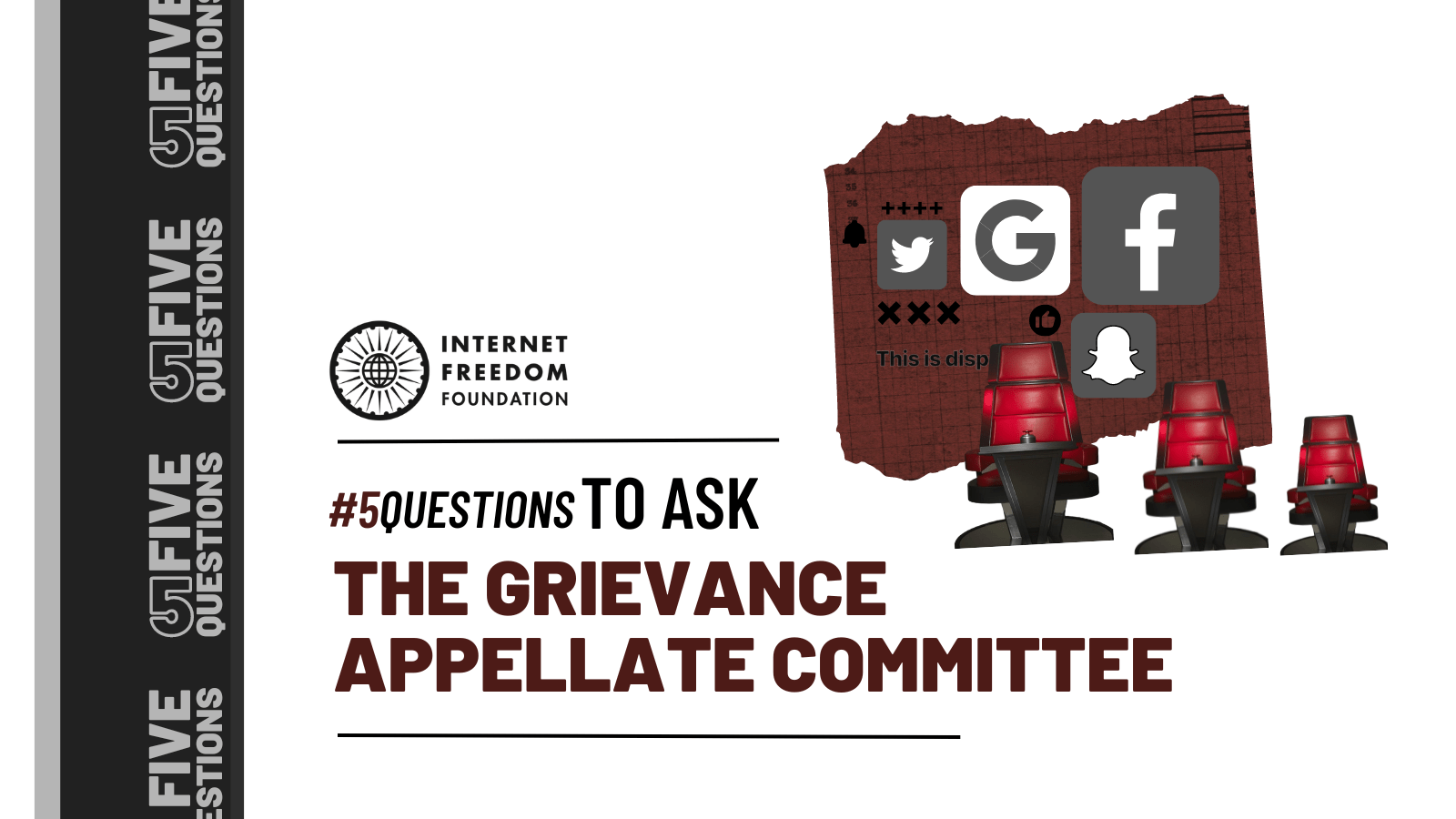
tl;dr
The three Grievance Appellate Committee(s) (GAC), constituted under Rule 3A of the notified IT Amendment Rules, 2022, become functional today, i.e. March 01, 2023. As part of our series #5Questions, here are 5 questions that are worth raising with the GAC, to help secure user rights and protect online freedom of speech.
Background
The Ministry of Electronics and Information Technology (MeitY) notified the Information Technology (Intermediary Guidelines and Digital Media Ethics Code) Amendment Rules, 2022 (IT Amendment Rules, 2022) on October 28, 2022. To address the alleged issue of grievances being “left unaddressed and unsatisfactorily addressed by internet intermediaries”, the government created additional avenues for grievance redressal, i.e. through executive-constituted committee(s) known as GAC(s). These Committees will adjudicate any appeal raised by aggrieved persons against the decision of the Grievance Redressal Officer of an intermediary to remove or not remove content. This raised concerns as it will essentially make the Union Government (instead of, ideally, an independent judicial or a regulatory body) the arbiter of permissible speech on the internet. It may also incentivise social media platforms and intermediaries to suppress any speech unpalatable to the government.
Empowered by Rule 3(1)(a), the Union Government established, by notification, three GAC(s) on January 27, 2023, i.e. three months from the date of commencement of the IT Amendment Rules, 2022. It was then revealed that these committees will become operational one month from their notification, i.e. from March 01, 2023. A virtual digital platform - wherein the entire appeal process, from filing of appeal to the decision thereof, shall be conducted - has also become operational from today.
In our public brief on the IT Amendments Rules, 2022, we raised our concerns around not just the GAC but also the Rules in general. Today’s post not just raises some previously asked questions, but also highlights procedural issues with the GAC based on recent media reporting.
#5Questions
Biting off more than the GAC can chew?
Q1. Do the GAC(s) have the competence and capacity to resolve user complaints, that too within the prescribed time frame, given the likely high volume of appeals?
Rule 3A(4) requires the GAC to deal with user appeals expeditiously and to make an endeavour to resolve the appeal within 30 calendar days from the date of receipt of the appeal. The obligation to resolve user appeals within 30 days raises several doubts around the feasibility of going through a bulk of appeals within the constricted time limit, the competence of the GAC to resolve complex user complaints, and the future of unresolved user complaints after 30 days. This approach will also fail to match on the scalability as can be demonstrated by some numbers given below. Table 1 shows the approximate number of decisions taken by certain significant social media intermediaries (SSMI), between October and December 2022, based on user reports and self reported numbers for proactive action or action taken. It is worth noting that these numbers do not account for appeals for which no action was taken, and hence the total number of appeals raised may be even larger.
Even if 1% of these user complaints reach the GAC, it will have to deal with at least tens of thousands of appeals per month. This number would vary and might even be significantly higher if other intermediaries, and not just SSMIs, with a higher audience are considered.
Reportedly, a person aware of the developments around GAC shared that “The government is expecting a major spike in cases and the portal will hopefully help to deal with the increased workloads”. Given the volume of the appeals, and in many instances the complexity of the content in question, one must ask whether three committees consisting of only three members will be able to operate at such scale.
A bolt from the blue?
Q2. Who will be appointed in the Project Management Units (PMU), what will be the qualification and responsibilities?
As per an Economic Times article, each GAC will have two people who will be appointed in the Project Management Units (PMU), in addition to the existing three members. While the IT Amendment Rules, 2022 elaborated upon the 3 member composition of the GAC, it made no mention of the PMU, which has reportedly been created in anticipation of a large number of complaints coming in. Given that this is potentially the first mention of the PMU, we are curious (read concerned) about the basis/ criteria for appointing the members of the PMU, the details about the composition of the PMU (number of members, qualification requirements, diversity of the Unit, etc.), and its roles and responsibilities.
Sophie's choice
Q3. How will the GAC prioritise among user appeals, and based on what criteria will it do so?
The news article also says that the PMU will “evaluate and prioritise” the appeals for the other GAC members to look into it. Following this prioritisation, the members will reportedly give their opinions on the matter and the chairman will discuss, deliberate and give a final verdict on the issue. Additionally, there would reportedly be three committees - one dealing with national security, one for content, and the rest of the complaints will go to the IT ministry. A recent article has also shared that segregation of cases among these three committees will be done “automatically”. Reportedly, the Ministry of Home Affairs led GAC will largely deal with “complaints on illegal or criminal activities”, the Ministry of Information and Broadcasting led GAC will handle “misinformation or fake content”, and lastly, the IT Ministry led GAC will work on issues relating to “copyright issues or any other unlawful activity that is otherwise not covered elsewhere”.
What follows the issue of scale is the issue of prioritisation and selection. If the GAC, despite its best “endeavour”, fails to resolve all appeals within the constricted time frame of 30 days, it could possibly adopt a process of sub-selection of unresolved appeals. Here, we’re unsure of how, on what basis, and by whom an appeal will be segregated among the 3 committees. Moreover, on what basis/ criteria/ parameters will the PMU determine the order of prioritisation? Given much of the reported unattributable statements from the Ministry does not provide much clarity on the process of selection, segregation, and prioritisation of appeals, many questions remain unanswered and concerns unresolved. Without any applicable, or legal framework for selection for appeals, there is likely an arbitrary “pick and choose policy”, leading to appearance, or the existence of bias. This discretion over which appeals they choose to resolve or prioritise is neither desirable nor advisable.
Bystander behaviour or intervention?
Q4. Can a person indirectly aggrieved also raise an appeal with the GAC against the decision of an intermediary?
Rule 3A(3) allows any person, aggrieved by a decision of the Grievance Redressal Officer (GRO), to appeal to the GAC against it, within a period of 30 days from the date of receipt of the decision taken by the Grievance Officer. What remains unclear is whether the “person aggrieved” has to be the user who originally raised the grievance with the GRO appointed by the intermediaries, or if any person, whether or not directly aggrieved by the decision of the GRO, may raise such an appeal.
Reviewing the review process
Q5. What will be the process of periodic reviews of GACs, and what will its frequency be? Will the GAC’s decisions be accompanied by reasoning and justification for each of its decisions?
A press release on the notification of 3 GACs also states that “Periodic reviews of GACs and reporting and disclosures of GAC orders will also be part of process.” We are appreciative of this move towards transparency and accountability. Further, in the spirit of such democratic principles, more information around the process of these periodic reviews must be revealed. Details shared could include, inter alia, who will be conducting these periodic reviews, the basis on which they were selected/appointed to do so, how frequently will these reviews be conducted, will the full reports (including detailed reasoning/justification) of the review be publicly available, will the GAC have a transparency reporting mechanism, etc.
Broad suggestions
Internet Freedom Foundation’s consistent ask with respect to the IT Rules, 2021, and any subsequent amendments, is their withdrawal in entirety. Given the significant and wide-ranging implications of the IT Rules, 2021 as well as the IT Amendment Rules, 2022, we request the government to reveal their underlying intent with respect to intermediary liability and online content regulation, before introducing any new amendments or replacements, which may take the form of white paper(s) and discussion paper(s). We also urge MeitY to share a clear articulation of the issues/risks/harms considered by the government, the results and analysis of any cost-benefit analysis undertaken by the government, the types/kinds of options and/or alternatives considered by the government to deal with these issues/risks/harms and their position(s) on each of them, and so on.
Important Documents:
- IT Rules, 2021 (link)
- Information Technology (Intermediary Guidelines and Digital Media Ethics Code) Amendment Rules, 2022 (link)
- IFF's Public Brief on the IT Amendment Rules, 2022 (link)
- GAC website (link)


